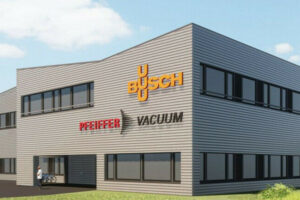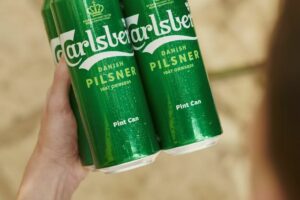cpp spoke to Jörg-Peter Mehrer, CEO of Josef Mehrer GmbH & Co. KG Maschinenfabrik, about the special design features and strengths of crosshead piston compressors. Mehrer took over the family-run enterprise from his father and uncles in 2008.
The author: Lukas Lehmann Assistant Editor in Chief
cpp: Mr. Mehrer, are your father and uncles satisfied with you?
Jörg-Peter Mehrer: You know how it is – sometimes they’re more satisfied, sometimes less so (laughs). I’m the fifth generation running this family enterprise. That’s rather rare in Germany. Too many shareholders and the concomitant conflicts of interest paralyse family firms or in many cases cause them to be shut down completely. This is why I bought up shares in the company from various family members, so that I’m now not just the CEO but also own a majority stake. Compared to other family businesses, that makes things far easier for me but I also bear a much greater responsibility.
cpp: In the coming year, Mehrer will be cel-ebrating the 125th anniversary of its founding. What were the most important milestones?
Mehrer: The most important of all was obviously when the company was founded in 1889. That was when my great-great-grandfather opened a repair workshop for sewing machines and bicycles here in Balingen. In 1916, Mehrer began developing and manufacturing oil-lubricated piston air pumps, which were used, amongst other things, for cleaning brewery equipment. Around 1928, we started building oil-lubricated piston compressors. They were followed by oil-free compressors. This evolution culminated in the oil-free vertical crosshead compressors we still sell today.
cpp: Crosshead piston compressors are your flagship product. What is so special about them?
Mehrer: For years now, we’ve successfully kept the old-fashioned but very efficient crosshead compressor principle up to date. Since the compressing machines involved work without oil, they run at comparatively low rotational and piston speeds. That makes them extremely robust and suitable for continuous operation with virtually no maintenance required. We’re talking here about customer service intervals of between 8000 and 16,000 operating hours, depending on the machine. Users of these compressors ultimately benefit from very high availability. The other advantages are the low operating costs and the broad temperature range for which the machines are suited. Efficiency is also important and piston machines perform best here.
cpp: Mehrer offers five different compressor series. What are they?
Mehrer: They’re the TEL, TZW, TEW, TRx and TVx. However, by 2015 we want to completely replace the TEL and TZW machines with our new TRx and TVx series. TR stands for Trockenlauf-Reihenanordnung, or dry running in-line configuration. We offer these machines as single-, two- or three-stage compressors or as boosters. The placeholder x in the name stands for these different versions. The TVx series includes crosshead piston compressors in a V-design, which – as is indicated by the letter x – are available with one, two or three stages or as boosters. All our series can be optionally supplied for Zone 1 and 2 hazardous areas. For applications with toxic or flammable gases we can also provide the systems with a risk assessment based on the performance level and documentation or furnish them with any locally required certificates.
cpp: Taking these five series as a starting point, your engineers create custom solutions that exactly satisfy the requirements of users in the most varied sectors. How is that done?
Mehrer: The series have a modular structure and each one is divided into several sub-types with regard to output and version. The machines can consequently be matched exactly to the application concerned. However, what I would really like to point out is that the customer doesn’t just acquire a simple compressor from us with no frills but can additionally choose between a compressor unit, also called a skid, and a turnkey solution.
cpp: What precisely does the term compressor unit mean?
Mehrer: In a unit the compressor, cooler, filter, separator and motor are all mounted on one base plate. The electrical control system for the unit is optional, in other words if the customer prefers, it can remain his responsibility.
cpp: And what does the customer get with a turnkey solution?
Mehrer: A complete enclosed compressor station with all the necessary machines and control components or with the ones specified by the customer. We supply them finish-assembled, install them and of course take care of the commissioning. The demand for turnkey solutions has gone up in the last two to three years.
cpp: Which compressor series are intended for the chemical and pharmaceutical industries?
Mehrer: That would be the TRx and TVx. These machines can be run at up to 88 bar (a) including an optional sealing gas application.
cpp: What do you mean by a sealing gas application?
Mehrer: It’s an application where the oil in the crankcase does not come into contact with the medium to be compressed, which can be corrosive, explosive or simply very pure. To prevent that, the piston rod packing is surrounded by a sealing gas such as nitrogen. This special sealing option for the rod is actually only available with crosshead piston compressors. The single-stage, water-cooled compressors in the TEW series are also used in the pharmaceutical industry. Their job is to provide ultra-pure air for packaging medicines.
cpp: In June this year, you plan to launch the TRx 200 and TRx 300 compressors in the market. Which capacity range will these machines cover?
Mehrer: Both the machines are dry running and we offer them in a single- or two-stage version. The TRx-200 compressors have an input power of 2.2 to 5 kW and are designed for a volume flow of 20 m3/h. The TRx 300 machines have an input power of maximum 10 kW and achieve a volume flow of 55 m3/h.
cpp: What are the special technical features of these machines?
Mehrer: The TRx 200 and TRx 300 series are air-cooled compressors. Compared to the predecessor models, a compression pressure of 28 bar can be attained with the new models. Basically, these compressors are available with different pistons. They moreover have O-ring seals, flange joints and an electric fan for the cylinder. They’re available with an oil heater and water cooling for the process gas as an option.
cpp: And what about the pistons?
Mehrer: Energy-optimised pistons are available in different materials and with different diameters. We use various types of valve, manufactured in application-specific materials, as inlet-outlet valves. The machines in the TRx 200 and TRx 300 series are genuine process gas compressors designed for 10,000 or 12,000 operating hours. They will replace the older TEL 50, TEL 60 and TEL 70 series as well as the TZL 10, TZL 20 and TZL 30.
cpp: You’ve had the TRx 700 compressors in your portfolio since 2006. So far, these crosshead piston types have only been available in a single- or two-stage version or as a booster.
Mehrer: Correct. But as of this year, we also offer a three-stage version of these machines. It incorporates the special features of the TRx 700 series, such as fast piston dismantling and hence simplified maintenance. They’re designed for a maximum pressure of 80 bar and up to 16,000 operating hours, which means they can be used, for example, for steam reforming or for compressing cleaned hydrogen for grease hardening.
cpp-net.com/0213400
Share:






